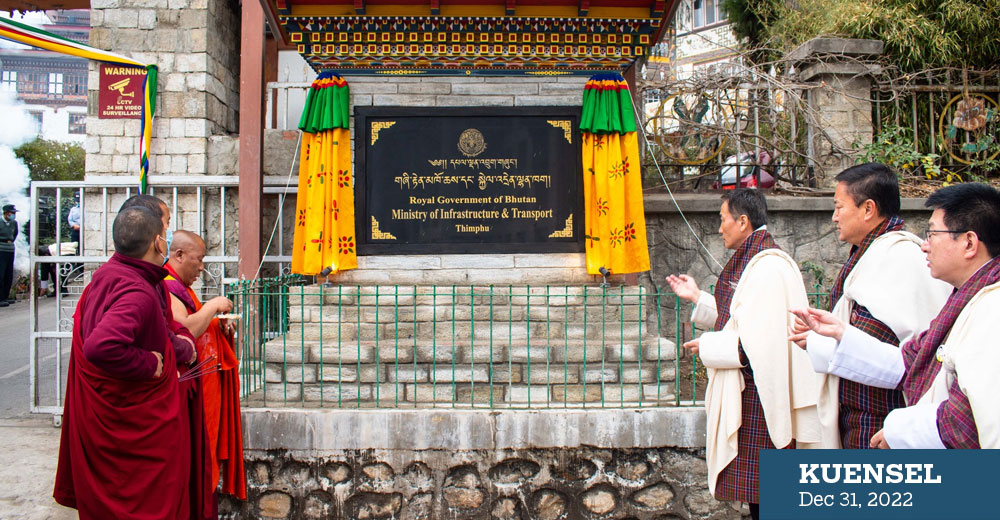… Cabinet yet to decide on which minister will step down
Dechen Dolkar
The Royal Civil Service Commission (RCSC) implemented the Civil Service Reform Act of Bhutan 2022 yesterday, reorganising civil service into nine ministries.
The implementation of the new ministries was held with a simple ceremony yesterday. Some of the ministries also posted pictures of ceremonies marking the new beginning.
However, the Cabinet has not yet decided on which minister will step down from the ministerial post and reshuffle the ministers. An official from the Prime Minister’s Office said that it has not decided on the reshuffling of ministers and who will step down.
The Civil Service Reform Act was passed during the winter session of the parliament that ended earlier this month.
According to the Civil Service Reform Act of Bhutan 2022, there are nine ministries: Ministry of Agriculture and Livestock, Ministry of Education and Skills Development, Ministry of Energy and Natural Resources, Ministry of Finance; Ministry of Foreign Affairs and External Trade, Ministry of Health, Ministry of Home Affairs, Ministry of Industry, Commerce and Employment, and Ministry of Infrastructure and Transport.
During the first reading of the Civil Service Reform Bill at the last parliament session, the Member of the Parliament (MP) Ugyen Wangdi asked if the government has decided which minister would step down since the Bill proposed to reduce the number of ministries to nine.
In response, Lyonchhen Dr Lotay Tshering said that if the reform benefits the country, two to three ministers are ready to step down from the ministerial post immediately.
Lyonchhen had said that he has even asked RCSC to bring it down to eight or increase more than 10 if it benefits the country. “I asked RCSC to review it independently.”
The nine ministries
The Ministry of Agriculture and Forests has been renamed the Ministry of Agriculture and Livestock. The ministry has four Departments with Department of Agriculture (DoA), Department of Livestock (DoL), Department of Agricultural Marketing and Cooperatives (DAMC) and National Biodiversity Center (NBC).
The Ministry of Education has been renamed the Ministry of Education and Skills Development. The National Commission for Women and Children Secretariat has been subsumed under the ministry and will serve as the secretariat of the commission.
The functions of Bhutan Medical and Health Council, Department of Occupational Standard of MoLHR, Quality Assurance and Accreditation Division and Higher Education and Planning Division of the former MoE, Engineering Council of Bhutan, and Bhutan Board for Certified Counsellors (BBCC) have been subsumed under the newly created Bhutan Qualification and Professional Certification Authority (BQPCA).
A new Ministry of Energy and Natural Resources (MoENR) has been created with five departments, the Department of Energy and Department of Geology and Mines transferred from the former Ministry of Economic Affairs.
The Department of Forests and Park Services moved from former Ministry of Agriculture and Forests. A new Department of Water consolidates the water resources management mandates from various agencies.
The National Environment Commission Secretariat (NECS) has been reconstituted as the Department of Environment and Climate Change. The department will function as the secretariat to the National Environment Commission. Bhutan Electricity Authority is renamed the Electricity Regulatory Authority (ERA).
The Bhutan Agriculture and Food Regulatory Authority, Bhutan Narcotic Control Authority and Drug Regulatory Authority have been merged as the Bhutan Food and Drug Authority and placed under the health ministry.
The Ministry of Home and Cultural Affairs is renamed Ministry of Home Affairs. The Department of Culture has been renamed as Department of Culture and Dzongkha Development after subsuming Dzongkha Development Commission (DDC). The department will be the secretariat to the Dzongkha Development Commission.
The ministry’s Department of Local Governance and Department of Disaster Management has been merged to form the new Department of Local Governance and Disaster Management.
The Ministry of Economic Affairs is now Ministry of Industry, Commerce and Employment with five departments.
Department of Industry and Department of Trade have been transferred from the former MoEA. The Department of Employment and Entrepreneurship and the Department of Labour, has been transferred from the former MoLHR.
The Department of Information and Media has been merged with the Department of Intellectual Property and renamed the Department of Media, Creative Industry and Intellectual Property.
The former Tourism Council of Bhutan has been subsumed under the MoICE as the Department of Tourism and will function as the secretariat to the Tourism Commission.
The Office of Consumer Protection has been renamed the Competition and Consumer Affairs Authority is moved under MoICE. The Bhutan Standards Bureau is under MoICE.
The Media Council of Bhutan and the National Film Commission have been merged with the Bhutan InfoComm and Media Authority (BICMA). BICMA will be under MoICE.
The Ministry of Works and Human Settlements is renamed the Ministry of Infrastructure and Transport with four departments: Department of Air Transport, Department of Human Settlement, Department of Infrastructure Development, and Department of Surface Transport.
The ministry also has two affiliated authorities viz. Bhutan Construction and Transport Authority (BCTA), and Bhutan Civil Aviation Authority (BCAA). The Road Safety and Transport Authority and the Department of Roads have been merged as the Department of Surface Transport.
The regulatory functions under the Department of Roads, Road Safety and Transport Authority, and Construction Development Board have been subsumed under the new Bhutan Construction and Transport Authority (BCTA).
The finance ministry has five departments. Department of Macroeconomic Affairs (DMEA) being renamed as the Department of Macro-fiscal and Development Finance.
The Department of Macro-fiscal and Development Finance will be the nodal agency for development finance (aid coordination) and debt management function in the country and hence, all matters relating to development finance and debt management will berouted through the Department of Macro-fiscal and Development Finance.
The Department of National Budget is now the Department of Planning, Budget and Performance (DPBP), the Department of Public Accounts is the Department of Treasury and Accounts.
The Department of National Properties is renamed as the Department of Procurement and Properties and Department of Revenue and Custom.


